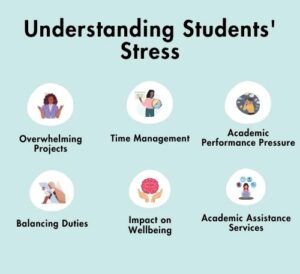Causes Of Stress In Students And How To Manage Them:
Introduction:
We often see that students face pressure from many sides. We can say that student life is full of challenges. We may experience exams, deadlines, peer pressure, or family expectations, all of which increase stress.
We can also feel stress when we try to balance studies, hobbies, and social life. Understanding the causes of stress in students helps us manage it better. We can take steps to reduce its negative effects and improve our overall well-being.
Academic Pressure:
We often experience stress when studies become too challenging. We may feel pressure to get high grades, complete assignments, or meet deadlines. We can feel overwhelmed when exams are near, or when we have too many subjects to study at once.
Often, students compare their performance with peers, which increases stress. We can manage this by creating a study schedule, breaking tasks into small parts, and asking for help when needed.
https://www.prospects.ac.uk/applying-for-university/university-life/5-ways-to-manage-student-stress
Time Management Issues
We may feel stress when we cannot manage our time properly. We often have classes, homework, projects, and personal activities at the same time. We can feel anxious when we try to do everything quickly and skip breaks. Often, poor planning leads to last-minute rushes and lower performance, increasing stress.
We can reduce this by making a timetable, prioritizing important tasks, and taking short rests during study sessions.
Peer Pressure
We can often feel stress when trying to fit in with friends or classmates. We may be pressured to behave in certain ways, join groups, or achieve similar results. We can also feel anxious when others make fun or judge us.
Peer pressure can affect both mental and emotional health. We can manage this stress by staying confident, making our own choices, and surrounding ourselves with positive friends.
Family Expectations
We often experience stress when families expect us to perform perfectly. We may feel pressure to get high grades or choose the right career path. We can feel anxious if we think we might disappoint our parents. Often, this stress affects our confidence and mood. We can manage it by communicating openly with family, explaining our challenges, and setting realistic goals.

Exams and Performance Anxiety
We may feel stress before exams or presentations. We often worry about failure, forgetfulness, or making mistakes.
This type of stress can affect concentration, sleep, and appetite. We can manage exam-related stress by preparing in advance, practicing past papers, and using relaxation techniques like deep breathing or meditation.
Social Media and Technology
We can experience stress when we spend too much time on social media. We often compare ourselves to others and feel that we are not good enough. Constant notifications and online pressure can distract us from studies.
We can reduce this stress by limiting screen time, focusing on real-life tasks, and practicing digital detox.
Lack of Sleep
We may feel stress when we do not get enough rest. Students often stay up late to complete homework or revise for exams. Sleep deprivation affects concentration, mood, and memory, increasing stress.
We can manage this by maintaining a proper sleep schedule and taking short naps when needed.
over commitment
We often say “yes” to too many responsibilities, like clubs, sports, and tutoring, which increases stress. We may feel exhausted and unable to perform well in any task. We can manage this stress by giving importance to activities, saying “no” politely, and focusing on what is most important.
Health Issues
We may feel stress when we have health problems or poor nutrition. Illnesses, fatigue, or lack of exercise can increase mental stress. We can reduce this by eating healthy food, exercising regularly, and seeking medical advice when needed.
Uncertainty about the Future:
We often feel stress when we are unsure about our career or life after school. We may worry about college admissions, job opportunities, or skills needed in the future.
This type of stress can cause anxiety and overthinking. We can manage it by setting achievable goals, learning new skills, and seeking guidance from mentors or teachers.
How to Manage Stress in Students?
- Time Management: We can create schedules to balance study and rest.
- Healthy Lifestyle: We should eat well, exercise, and sleep properly.
- Relaxation Techniques: We may practice deep breathing, meditation, or yoga.
- Positive Social Support: We often share problems with friends, family, or counselors.
- Limit Social Media: We can reduce online distractions to focus on real tasks.
- Set Realistic Goals: We may avoid unnecessary pressure by planning achievable targets.
- Seek Professional Help: We can consult counselors or psychologists if stress becomes too much.
FAQs
Q1: What is the main cause of student stress?
We can say academic pressure and family expectations are among the main causes of stress in students.
Q2: How does stress affect students’ health?
We often see that prolonged stress can cause headaches, poor sleep, anxiety, and weakened immunity.
Q3: Can exercise help reduce student stress?
Yes, we can manage stress by exercising daily, which improves mood and reduces mental pressure.
Q4: How can students manage exam-related stress?
We can reduce this stress by preparing early, practicing past papers, and using relaxation techniques.
Q5: Can social media increase stress?
We often feel stress when we compare ourselves to others online or spend too much time on screens.
Conclusion:
We can see that students face many challenges that increase stress, including academic pressure, time management issues, peer pressure, family expectations, and health concerns.
We may not describes all stress, but we can manage it by organizing time, taking care of our health, practicing relaxation, and seeking support when needed. We often feel calmer, happier, and more focused when we address the causes of stress in a proper way.

